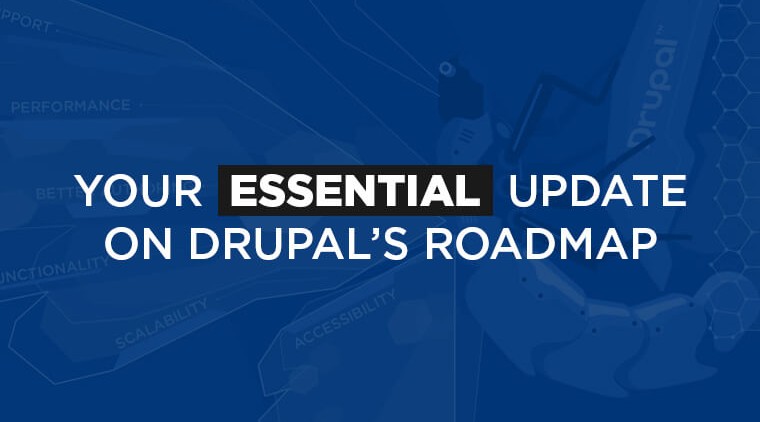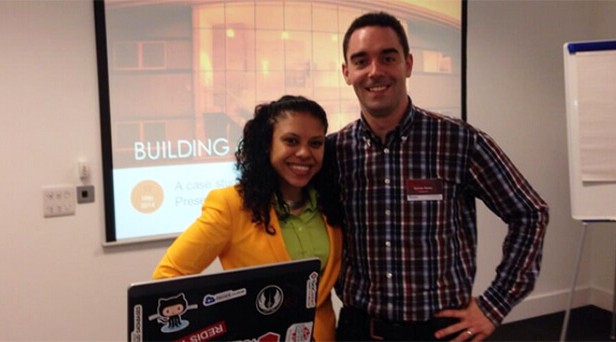The digital world never stops evolving. New technology –and with it, new user behaviour and expectations - means the challenges marketers face keep evolving too. This article looks at the big digital trends in 2024 and beyond, what problems they pose for marketers, and how the web framework Laravel can help meet them.
Why web frameworks matter to digital trends
Web frameworks don’t seem like an obvious concern for marketers but can be a critical factor in digital marketing success. Recent research by Gartner found 50% of senior marketers agree martech is complicated and difficult to use; 63% the lack of technical skills to successfully integrate and operate technologies in their stack. So, choosing the right digital platform is essential.
Web frameworks use collections of pre-written code that act as building blocks to be assembled, along with libraries that extend the framework’s core features, making the whole development process more efficient. Add to that the ability to integrate an infinite number of APIs and you can build whatever’s needed for your business, data and user requirements, connecting front-and back-end systems.
An example might be our work building a bespoke web application for seamless door-to-door delivery solutions provider, Argid Technologies, on the open-source, PHP-based web framework, Laravel. It fully integrates with a variety of logistics companies to provide currency rates, pricing and real-time package tracking information and more. The single app is now powering a variety of B2C and B2B ecommerce sites and portals for the Argid team, partners and suppliers. It continues to scale; delivering an 83% conversion improvement on its premier brand, First Luggage.
Essentially, open-source web frameworks like Laravel can create web applications that perform and evolve over time: vital to keep up with digital trends.
So, what are the big digital trends and marketing challenges for 2024 and how can Laravel help?
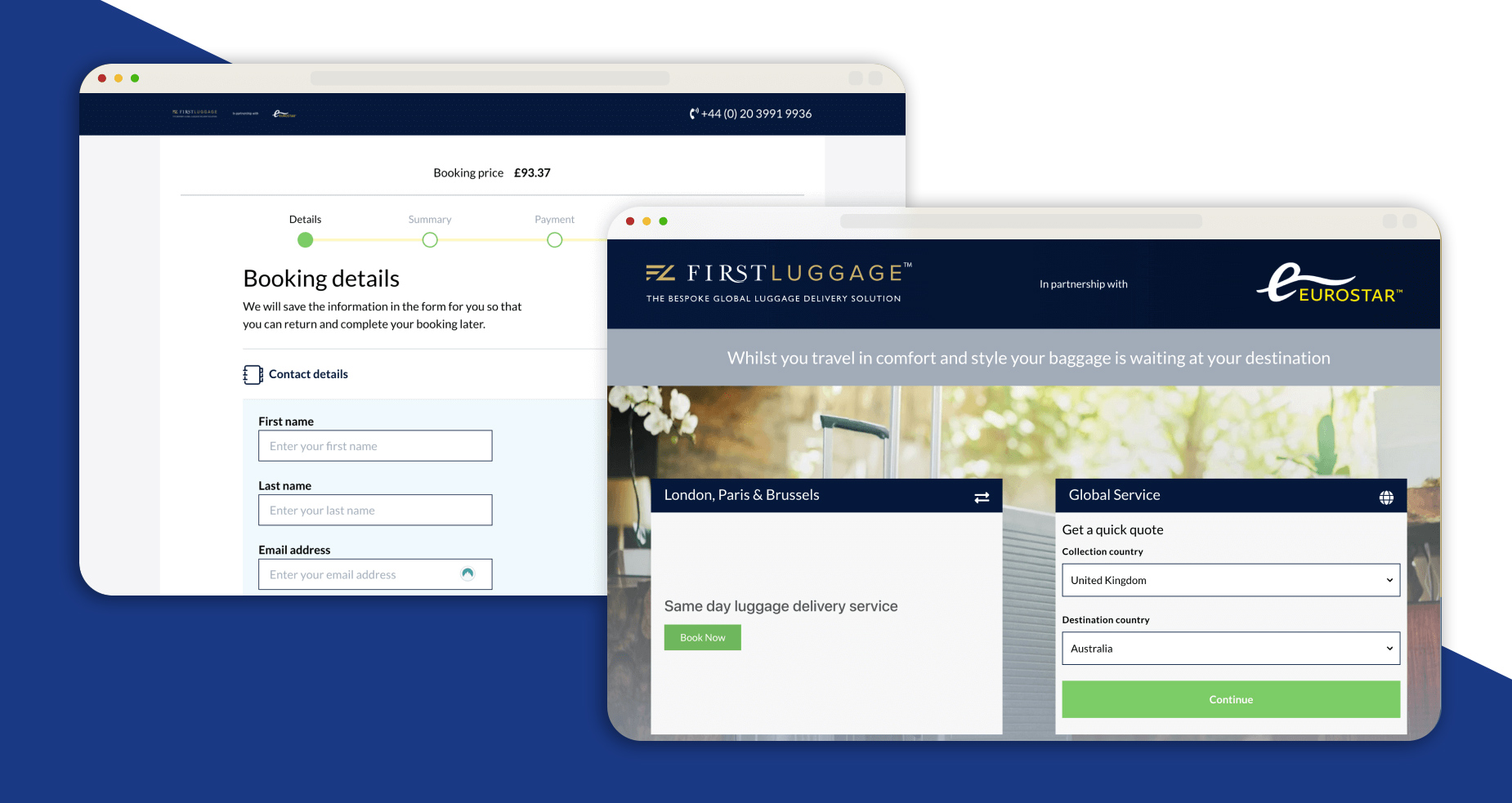
Key webpages from the First Luggage and Eurostar partner website
1. Doing less with more - optimisation the priority
Nope, it’s not AI in first place, despite all the headlines. What’s really driving marketers in 2024 is the need to deliver cold hard results, fast. In a recent survey by Modern of CMO’s, nearly 75% cited short-term company commercial growth as their most pressing priority in the next 12-18 months, echoed by Forrester’s global CMO report. This means a ruthless focus on digital marketing fundamentals.
Optimising for a new world of search
The world of search is changing, which we wrote about in our recent article on changes to Google search: success equating to high-quality content that’s easily found by search engines and delivered in the fastest, most user-friendly way.
Laravel is ideally suited to the demands of this new search environment. Its routing system allows developers to easily create and organise clean, descriptive, and SEO-friendly URLs. It’s also great for structured data markup, like JSON, that gives search engines additional context about the content. This leads to better SERP appearance with rich snippets and infographics that can improve click-through rates and a must for AI search. Laravel also has numerous packages like Laravel Meta Manager and SEOTools to support this and its API-friendliness means you can also pull in external tools like Semrush. Laravel can also manage rich media and videos via Vimeo or YouTube APIs or using customisable video player libraries like Video.js or Plyr that can be embedded directly into the app that provide content for rich snippets and better SERP.
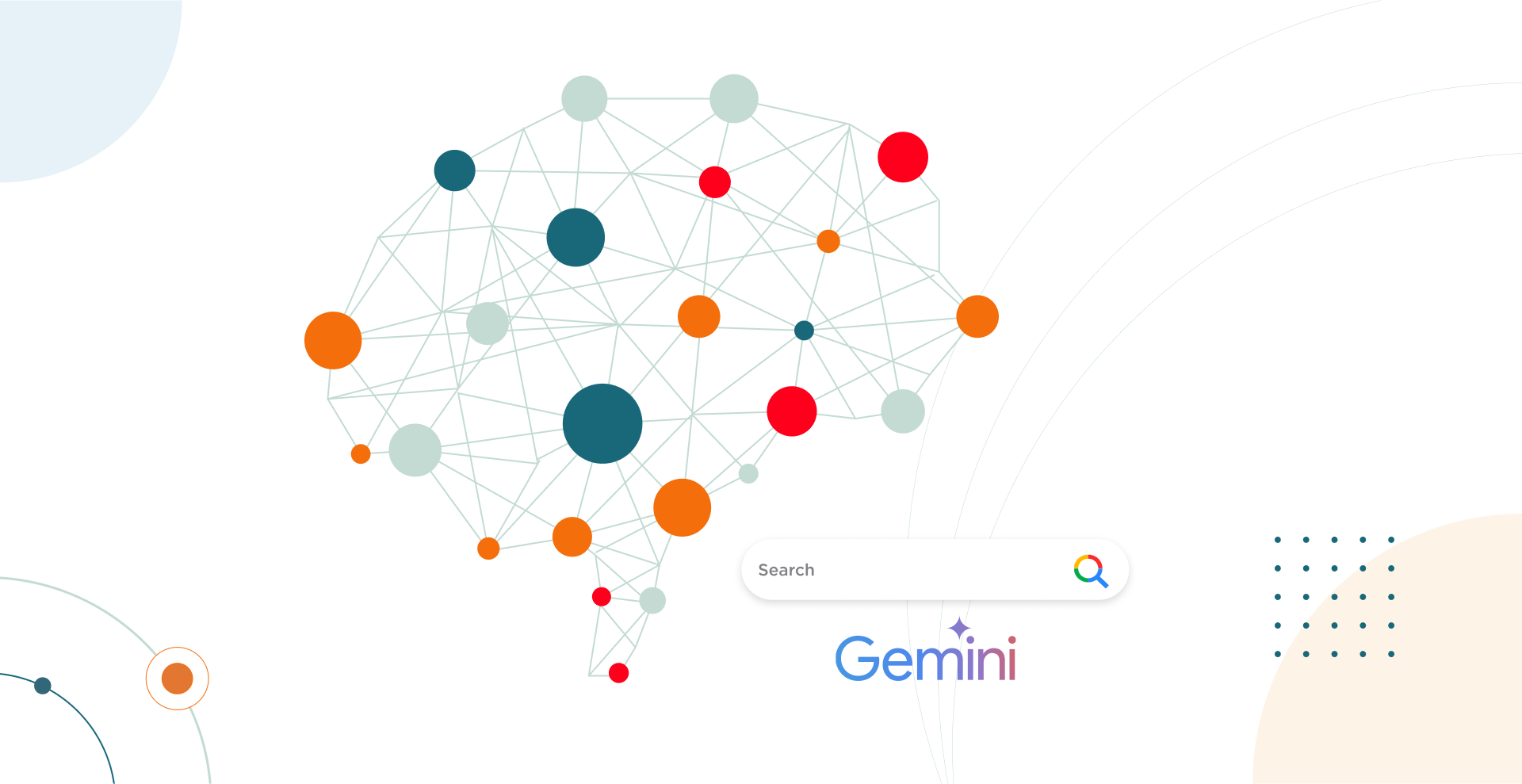
Gemini is Google's AI Model, used to power many of its products, including Gmail, Docs and their search engine.
Web application speed and usability inform Google’s Core Web Vitals that play a major role in determining search ranking, which Laravel’s technical features deliver. For example, its Forge package allows developers to deploy PHP applications on a variety of hosting platforms. As your business grows, you can add more servers to deliver your content and manage the load on each of them separately. It also lets you store big data remotely, instead of on your own database that can slow the site down. Laravel’s caching mechanism also keeps speeds up: for frequent queries that trigger slow loading times, you can cache the results to speed up subsequent queries and reduce server requests.
Laravel also supports responsive, mobile-friendly frontend frameworks that can be optimised for preferential treatment in search rankings. And because it can be integrated with all types of traditional and headless CMS (we’ve delivered Laravel apps pulling content from Drupal, Contentful, Hubspot and WordPress backend systems), it means marketers can have the CMS they need to deliver the high-quality content needed for search and the ability to change it, as your business needs change over time. An example being the dynamic website for Eurofighter, which is on its second front-end, powered by the same Laravel app.
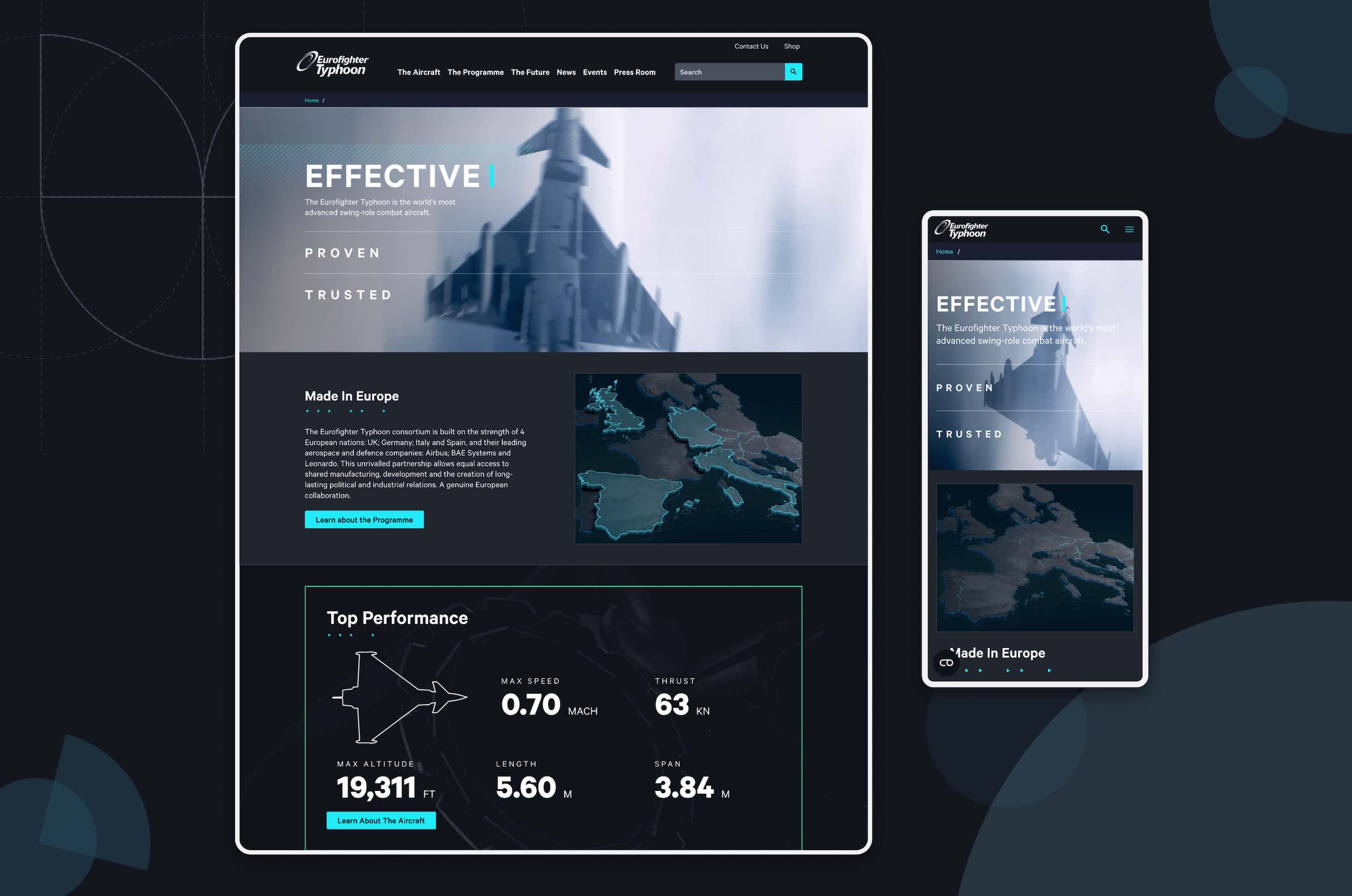
Displaying the Eurofighter website in both desktop and mobile format
Optimising for lead generation and conversion
Getting people to your site is only half the job. Once there it’s all about ensuring that users take the actions you want and convert into leads.
Laravel integrates with most A/B testing frameworks and analytics tools like Google Optimise and Hotjar, letting marketers experiment with different web features and measure impact on lead generation and conversion rates. Advanced search capabilities with Laravel Scout integrates with leading search engine solutions like Algolia or MeiliSearch to let users find what they need quickly, while Laravel Socialite allows users to register and login with Facebook, X and Google that reduces sign-up friction.
Laravel Nova provides powerful dashboards for application data that lets marketing teams make data-driven decisions to drive conversions. Laravel and Pusher allow real-time notifications to engage users and prompt immediate actions. And of course, Laravel’s API-first framework can integrate with marketing platforms like Mailchimp, Salesforce, HubSpot for better lead nurturing and CRO.
2. Making AI deliver in practice – Laravel is structured for success
No-one can have escaped the meteoric rise of AI in the past year. According to a recent report by Semrush, AI-related domain traffic rose by a staggering 1,000% in 2023: 35% of marketers are already using AI to analyse marketing data and 38% to automate specific SEO tasks.
AI can meet the big priority of driving revenues by helping to understand user needs and provide personalised marketing, content and experiences. Long heralded as the marketer’s holy grail to reduce acquisition costs by as much as 50%, personalisation at scale now seems possible.
But for AI to deliver marketing ROI requires sophisticated data analysis, automation, and responsive user interface capabilities working together seamlessly behind the scenes. According to a survey for MITSloan by Amazon Web Services (AWS), 93% of marketing leaders know that data strategy – curating, improving quality and integrating data - is critical to get value from generative AI, but 57% had made no changes to their data thus far.
Laravel is ideal to tackle this challenge due to its modular software architecture based on the original Model, View, Controller (MVC). In its simplest form, the Model (the data and data management of the app) whether a single database or multiple data storage systems, responds to user requests and instructions. The View is the user interface which takes data from the Model and renders it into suitable forms. The Controller is the coordinator of this, receiving user input and making requests of the Model and the View to perform appropriate actions.

Diagram presenting an AI-enhanced MVC architecture
Because these three aspects are separate, it’s easier for marketers to implement data and AI functionality in the Model layer, without necessarily having to rebuild or disrupt the entire application.
Developers can then use Laravel packages and components like prediction IO and predictive analytics toolkit to find patterns in user behaviour like browsing history or interactions to deliver more relevant content, product recommendations, or services in real-time.
AI libraries like TensorFlow can enable the real-time generation of images, text, and other forms of data. External libraries like PHP-ML and numerous AI integrations supports tasks like natural language processing (NLP) to help with user engagement through sentiment analysis, keyword extraction, and content summarisation. Packages like Image Intervention and Image Recognition enable image recognition functionality. All of which can feed into a truly dynamic, personalised front-end such as React or Vue.js, making the possibilities for AI implementation almost limitless.
3. Delivering engaging customer experience
In 2024, the sheer amount of potential content, products and services is overwhelming. There are hundreds of millions of active websites, scores of thousands of SaaS platforms, six-plus million apps on Google Play, Apple App Store and Amazon alone, generating 150+ billion app downloads in 2023. With all that choice available, it’s unsurprising research by Salesforce finds 80% of customers feel overall customer experience matters just as much as product and service quality.
Getting value out of conversation
Recent HubSpot research says 55% of businesses predict that in 2024, most people will turn to chatbots over search engines for answers. Whether that level of adoption is realistic, it’s certainly a direction of travel, particularly with AI search. And voice search is now ubiquitous.
Laravel's flexibility allows developers to easily incorporate conversational interfaces and voice search functionality. At the most basic, Laravel integrates with AI chatbots like Google Gemini, supported by its packages like laravel-chatbot or laravel-dialogflow that can build conversational AI interfaces for customer support or product recommendations. Laravel also integrates with voice recognition APIs like Google Cloud Speech-to-Text or Amazon Transcribe for voice-enabled applications. Packages like Laravel Echo and Pusher also allow real-time chat, notifications, and updates across multiple channels, enhancing the overall experience.
Delivering on augmented and virtual reality
Augmented and virtual reality are becoming commonplace, particularly in retail for ‘try-ons’, in property, architecture, education, engineering and healthcare; underlined by the imminent launch of Apple and Meta’s next gen VR headsets. Research from Shopify indicates that AR experiences can boost ecommerce conversion rates by 40%. Again, Laravel’s flexibility comes to the fore. AR content can be integrated into web apps using libraries like AR.js or A-Frame, and experiences that involve image recognition can be built with libraries like ARToolKit or Vuforia.
For VR, Laravel can integrate 360° videos into web applications using HTML5 video players or specialized VR players like Video.js VR and room-scale VR experiences, where users can move around physical spaces and interact with virtual objects, achieved using tools like Unity or Unreal Engine.
Leveraging user-generated content
A critical way to engage users is with user-generated content (UGC), whether that’s images, videos, product reviews, testimonials, or even podcasts. Because in 2024, people simply trust UGC far more than brand-created or influencer content, particularly younger audiences, helping engagement.
But of course, this comes with the challenge of moderating UGC, ensure its quality and protecting brand reputation from hateful, spam or adult content. Again, Laravel can integrate leading content moderation APIs like Google’s Perspective or Microsoft’s Content Moderator.
4. Ethical tech - in practice, not just purpose
While marketers are focusing on performance rather than purpose, as we've described above, the desire for trustworthy, ethical behaviour by business hasn't gone away.
Being trustworthy with data
With the death of cookies on the horizon and heightened concerns around data privacy and AI, knowing what data you’re capturing, how it’s being processed, and ensuring it’s adequately protected to achieve compliance with GDPR and similar emerging privacy laws in the United States is critical.
From a data capture and processing perspective, Laravel has a huge amount of built-in support to prioritise user privacy. It has robust encryption and hashing of sensitive data like passwords and authentication tokens, database anonymisation through its Laravel GDPR package, data retention management using its task scheduling feature to automatically delete or archive user data, auditing and logging features to monitor compliance and far more besides.
From a security perspective, Laravel has one of the best names in the industry. While all software requires daily vigilance and ongoing maintenance to keep up performance and security, Laravel takes care of many security concerns automatically. It also allows you to plug in other security applications such as CAPTCHA to further enhance your security.
Minimising digital's environmental impact
We’ve written before about how better UX design and technical implementation can tackle the huge environmental impact of digital. Given that consumers want sustainability built-in to the products and services they use and investors want to see ESG generate returns not just good intentions, it is again about doing more with less.

Our model for the 10 foundations of sustainable experience design
Again, Laravel’s architecture can help. Its resource management and performance optimisation features help reduce energy consumption and carbon footprint. And building on Laravel’s already optimised code, caching strategies, and server configurations, means you reduce environmental impact while delivering fast and sustainable digital experiences. A win-win-win for marketers, customers and the planet.
In Summary
There are any number of other marketing and digital trends we could have touched on from social media e-commerce, the rise of video-led search, cryptocurrency and blockchain and far more besides. But what’s clear is that your web app and digital ecosystem needs to be able to evolve and scale to meet those emerging challenges, which is where Laravel really comes into its own. You can read our Laravel white paper about how we’ve worked with clients for a decade-plus to scale and secure their digital platforms alongside their growing business needs.
If you are looking to renew an existing web application, want to build a new one, or have a Laravel application that’s not delivering on your marketing ROI, get in touch with our web application experts today to find out how we can help.


